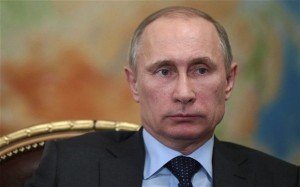
Vladimir Putin Considering Overturning Online Poker Ban

One of the better poker faces among world leaders, Russian President Vladimir Putin is contemplating turning to online poker to help fund the country’s national sports programs. (Image: Reuters)
Vladimir Putin isn’t the most popular world leader, especially in the United States where a recent Gallup poll found that Americans have a 60 percent unfavorable view on the Russian president.
Putin has inserted his powerful country into the Syrian Civil War, granted asylum to National Security Agency whistleblower Edward Snowden, restricted gay and lesbian civil rights, and most recently flew bomber jets just 40 miles off the coast of California on July 4th.
But Putin, whose presidency began with wages tripling and incomes rising nearly three percent, is now trying to combat an economic crisis, and the country with strict regulations that outlaw poker is now considering legalizing it both in land-based and online venues after a study revealed Russia stands to reap upwards of $100 million annually from iPoker legalization.
Putin’s Poker Face
Russia wasn’t always so cold regarding online poker.
In fact, poker rooms were popular destinations in big cities throughout the country, and until 2009, it was a prosperous market.
That all changed after Putin decided to crack down on underage drinking, smoking, and gambling.
Effective July 1st of 2009, Russia banned all forms of gambling except for in four designated gambling zones, most of which were located in remote areas inaccessible by youth.
Putin’s attempts to curb underage gambling were commendable, but his stoic position is changing as the country desperately needs new sources of revenue.
And according to Russian businessman Vasily Anisimov, a man worth nearly $2 billion and a close friend to Putin, there’s no better industry than online poker to increase taxes.
Anisimov asserts proper regulation of online poker would lead to proceeds so great it could fully fund Russian national sporting entities including the Chess Federation, a proposition that appeals to Putin.
After ordering a report on how lotteries and possibly sports betting could increase budgets earlier this summer, Putin commissioned an additional study this week to determine the financial benefit of legalizing online poker.
Proof Is in the Putin
Just five months ago, Putin doubled down on his iPoker ban by informing Russian Internet service providers (ISP) that they can be held responsible should citizens access gambling networks on the government’s blacklist through their services, declaring it’s the ISP’s responsibility to block forbidden websites. The most notable poker site on said list is of course PokerStars.
But as Putin publicly appeared steadfast in his opposition to iGaming, his reversal of opinion regarding online poker has been years in the making as Russian banks were hit hard by the credit crunch in 2008.
After a recovery and growth period from 1999 to 2008, the country has taken a turn for the worse of the last seven years.
Following its annexation of Crimea and its ongoing conflict with Ukraine, the United States, Japan, Australia, Canada and most European Union countries introduced sanctions on Russia that also hampered its economy.
Throw in the plunging oil prices experienced over the last year and it’s easy to see why the ruble lost nearly a quarter of its value in 2014.
Should the study on online poker show reason to end its prohibition, Putin will be forced to make a drastic change in his position.















0 Comments